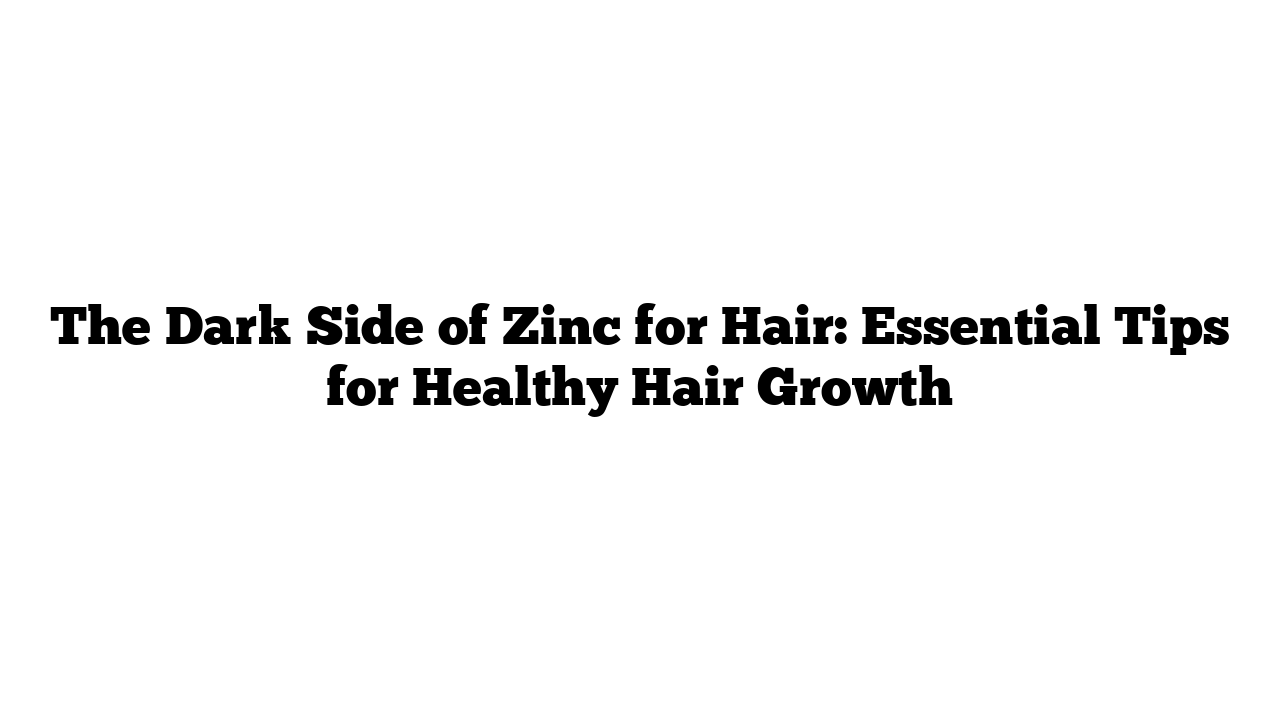Zinc is widely recognized as one of the most vital trace minerals for maintaining healthy hair. While it plays a significant role in hair growth, it’s crucial to understand that both zinc deficiency and excess can lead to similar hair problems. In this article, we’ll explore the intricate relationship between zinc and hair health, the potential pitfalls of over-supplementing, and essential tips to ensure your hair remains vibrant and strong.
What is Zinc?
Zinc is an essential trace mineral that is involved in over 300 different enzymes and is crucial for many bodily functions, including:
- Immune system health
- Testosterone production
- Sensory functions like smell and taste
- Vision
- Skin health
Given its broad influence, it’s no wonder zinc is often touted as a powerhouse for hair growth.
How Zinc Affects Hair Health
The Role of Zinc in Hair Growth
Zinc is essential for the proper functioning of hair follicles—the tiny pockets in the scalp from which hair grows. Here are some key points about zinc’s role in hair health:
- Supports Hair Follicle Growth: Zinc is vital for the development and maintenance of hair follicles. Without adequate zinc, you may experience hair thinning or loss.
- Strengthens Hair: Zinc aids in the production of collagen and keratin, two proteins that are crucial for keeping hair strong and elastic. A deficiency can lead to brittle, weak hair.
- Enzyme Production: Zinc is necessary for the production of certain enzymes that manage the hair growth cycle. If these enzymes are lacking, you may face issues such as shortened hair growth phases.
Symptoms of Zinc Deficiency
A deficiency in zinc can manifest in various ways, particularly in your hair:
- Hair Loss: Thinning or loss of hair can occur when zinc levels are low.
- Brittle Hair: Hair may become weak and prone to breakage.
- Dullness: Hair may lose its shine and vibrancy.
The Risks of Excess Zinc
While zinc is crucial for hair health, too much zinc can be just as detrimental:
Copper Deficiency
Excess zinc can lead to a copper deficiency, as these two minerals work in tandem within the body. Here’s why copper matters for hair:
- Hair Color Maintenance: Copper helps maintain the natural color of hair. Insufficient copper may result in premature graying.
- Structural Integrity: Copper contributes to the strength and structure of hair, reducing the likelihood of hair loss and thinning.
Symptoms of Too Much Zinc
Over-supplementing zinc can lead to side effects, including:
- Nausea
- Vomiting
- Decreased appetite
- Abdominal cramps
- Diarrhea
- Headaches
Recommended Zinc Dosage
For adults, the upper limit of zinc intake without adverse effects is approximately 40 mg per day. However, certain conditions may necessitate higher dosages, such as autoimmune diseases or infections.
To avoid the negative effects of high zinc intake, it’s essential to maintain a 10:1 ratio of zinc to copper. For example, if you take 40 mg of zinc, aim for 4 mg of copper to help balance the minerals in your body.
How to Ensure Healthy Zinc Levels
Dietary Sources of Zinc
To support hair growth and overall health, incorporate zinc-rich foods into your diet. Some excellent sources of zinc include:
- Oysters: The richest source of zinc.
- Red Meat and Poultry: High in bioavailable zinc.
- Fish and Shellfish: Provides a good amount of zinc.
- Dairy Products: Cheese and milk can contribute to your zinc intake.
- Nuts and Seeds: Cashews and pumpkin seeds offer some zinc as well.
Factors Affecting Zinc Absorption
Be mindful of factors that can impair zinc absorption:
- Gut Inflammation: Conditions that affect the gut may hinder zinc uptake.
- High-Carb Diets: Diets rich in refined carbs may decrease absorption.
- Phytic Acid: Found in grains, this anti-nutrient can block zinc absorption.
- Hormonal Treatments: Estrogen can inhibit zinc absorption.
Final Insights
Zinc is a remarkable mineral with significant benefits for hair growth, but balance is key. Both deficiency and excess can lead to hair problems, so it’s important to monitor your intake and maintain a healthy diet. If you’re considering zinc supplements, consult with a healthcare professional to determine the right dosage for your needs.
For a deeper understanding of zinc and its health implications, be sure to visit medicaltimes.io for more informative articles.
